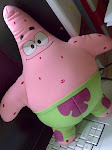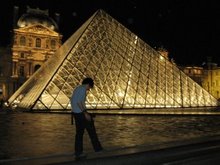One is an elaborately designed book with an elegant imprint of a wax seal printed on the cover, giving an impression of sacredness. The other is a simple book with a plain cover bearing the title of the book as well as the author’s name against a background of solid gold pieces with a small image of gold coins stacked on top of each other at the bottom right corner.


After a long wait, I’ve finally finished reading both books since I first bought them almost 4 months ago. Anyway, the titles are The Secret and The Science of Getting Rich. Naturally though, this self-help category is not my kind of book but well I chanced upon an offer 4 months ago, selling these 2 books as a bundle and based on my friend’s recommendation and what I gathered going around in the news back then, the books are worth my money. To be exact though, the first time I bought the ‘bundle’, I’ve never heard of the latter. The Secret literally overshadowed its counterpart I guess and all my focus was initially riveted to the more elaborate book. Even until a week ago before I started reading The Science of Getting Rich, all my attention was still entrenched with The Secret.
Just this evening after I finished The Science of Getting Rich, a word floated to the surface of my consciousness and unexpectedly, the word is ‘plagiarism’. Considering that I first read The Secret before The Science of Getting Rich, I might have been affected by the new information still fresh in my head and thus, it is more than possible that I coin theories that are only slightly similar as synonymous and one. At this point, I am quite aware that whatever I’ve written is vague at best and you are wondering which author is copying who. Now, I’ll add in a piece of information – the author of The Science of Getting Rich, Wallace D. Wattles died almost a century ago.
If he was still alive, it would be more than tempting to assume that Wallace would have sued Rhonda Brynes. Then again though, I would concede to the fact that while their contents are by far and large similar, their methods of expressing their ideas are more suited to their respective eras. The Secret wouldn’t fit in Wallace’s era as much as Wallace’s masterpiece is no longer attractive in our milieu. In fact, Wallace’s book has an obvious and uncovered deference to Jesus or the presence of a God. The Secret though is a watered down version. You will still get the feeling that the author is trying to preach religion but Rhonda is aware that there are people like the atheists as well and minimal reference to God is made. The best part of it all is that she is aware that God is relative to everyone. Even an atheist can have a God called Reason.
As for the contents, both books pretty much contain the same basic principles that are perhaps decorated with different examples. What is different between the two is the relevance with which the books are written. While one is more concerned with amassing riches, the other is more all-rounded, encompassing the different aspects of life such as health, relationships, jobs.
So what exactly is the content? In my own words, against the ‘Like Theory’ of the two books, I will call it – be positively positive. And as I would say, ‘I am not a pessimist, just an opportunist. Not an optimist, but a pragmatist’. No matter what the situation, life still goes on. Have a goal in life, have faith in yourself and everything else will take care of itself.
Having a goal is important because it is like the captain of the ship. Your goal sets the next destination of your ship, it determines what you are going to do. A goal though need not be too complicated or long-term. A simple short-term goal will suffice. A house is not built overnight; it is built over months, years with phases being completed one after another, slowly but surely. You can only do what you can today, not in the past or in the future. You might plan for the future, but what if the future never comes? Do with your best what you do today to build a better tomorrow, instead of doing what you do today to fit into the future that you dream for it might not manifest itself.
Have faith in yourself, because your potential is endless. If you have tried your best and the outcome is far worse than your expectation, can you really call that your best? Your best is not a quantity, it is a window of endless possibilities. Your best is being the best.
All in all though, the ideas provided by both books are useful for everyone. However, neither book should be strictly taken as a guide to life for each person will eventually have to find his/her own way. Sure ideas are there for you to learn and adopt, but you are a character of your own. Choose only principles which are aligned with your nature. Do not try to mould a new you trying to fit 100% with the book because there really is no one panacea. There is no one-size fits all approach. Take the two authors featured here as an example. They used the same principles but each expressed them slightly different from each other. You can have the same theory of life but interpretations will vary widely from one person to another.
The two books are worth the money but only if they are read and compared with. Only through comparison can you understand the different perspectives that people have over the similar theory. In fact, it would be best to read other books of the topic by other authors to compare their different perspectives. Then again, there is no point to be obsessed over a simple theory. The best thing that you can do for yourself, is to know what is best for yourself. Right?
Indonesia, watching MAMAMIA
27/12/07


No comments:
Post a Comment